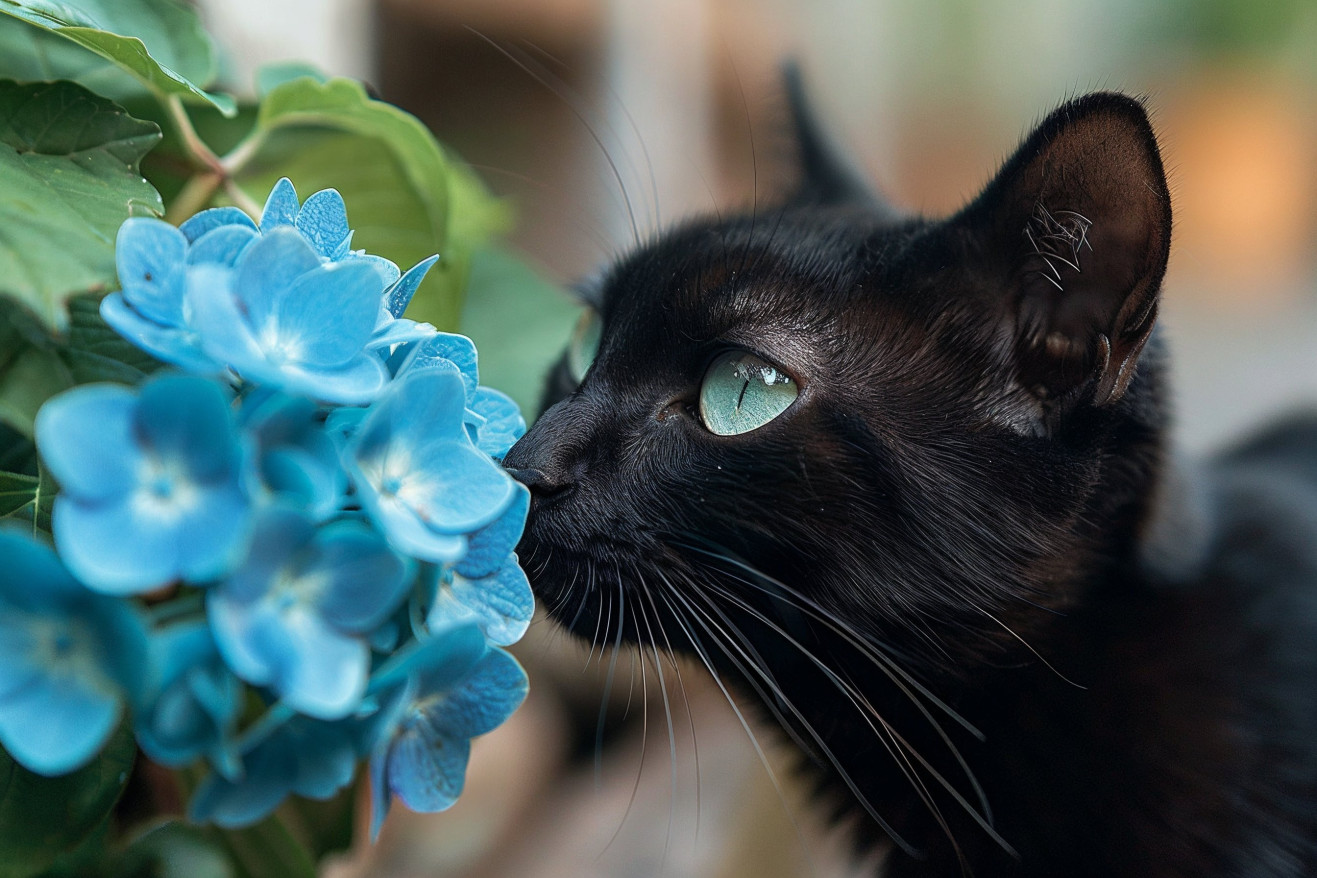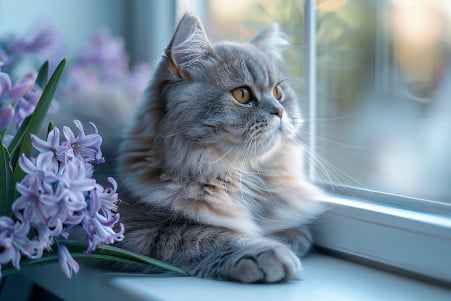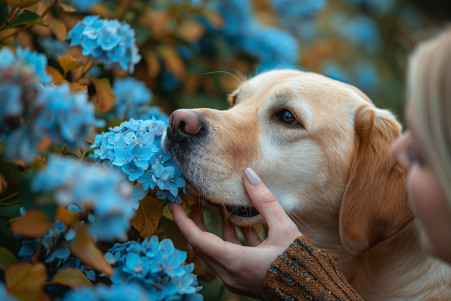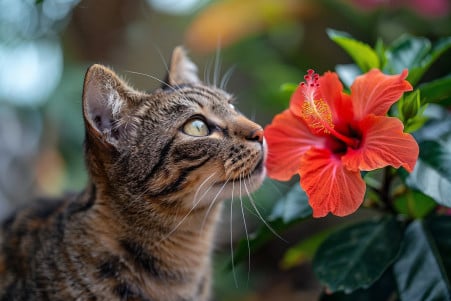Can Cats Eat Hydrangeas? What Pet Parents Should Know
8 June 2024 • Updated 8 June 2024

If you have a cat, you may be wondering if you need to be concerned if they decide to take a bite out of the beautiful hydrangeas growing in your garden. The good news is that hydrangeas are not poisonous to cats and are safe for your furry friends. While there is a potential for minor gastrointestinal upset if your cat eats a large amount of the plant, hydrangeas are not toxic to cats and are not considered poisonous to them in small amounts.
This article takes an in-depth look at information from reputable sources like veterinarians and studies on plant toxicity in cats. By examining the potential dangers and risks of cats eating hydrangeas, you can learn what you need to know to protect your cats while still enjoying these popular ornamental plants in your garden. Let's take a closer look at the facts about the safety of hydrangeas for our inquisitive feline friends.
Are hydrangeas poisonous to cats?
What Makes Hydrangeas Poisonous to Cats and What Happens When Cats Eat Them?
The poisonous nature of hydrangeas to cats is due to the presence of cyanogenic glycosides known as amygdalins in all parts of the plant. These compounds are hydrolyzed in the body to release cyanide, notes PetMD. The highest concentration of amygdalins is found in the leaves and flowers.
Cyanide is a toxic substance that inhibits cells from using oxygen, leading to a variety of harmful effects in the body. As Catster notes, symptoms of cyanide poisoning in cats who have eaten hydrangeas include vomiting, diarrhea, lethargy, loss of appetite, and difficulty breathing. More severe reactions can include an increased heart rate, depression, and disorientation.
This toxic process is explained in more detail in a study cited by WagWalking - the amygdalins react with water in the gastrointestinal tract to form hydrocyanic acid, which is then absorbed into the blood and interferes with the body's ability to use oxygen at the cellular level. While hydrangea poisoning is rare due to the large amounts of the plant that must be consumed, the consequences can be dire, so it's best to play it safe.
How Hydrangea Poisoning in Cats Is Diagnosed and Treated
Veterinarians can diagnose hydrangea poisoning in cats based on the symptoms the cat is showing and a known history of exposure to the plant, says WagWalking. To rule out other conditions, blood work and other tests may be conducted.
Treatment for hydrangea poisoning in cats is centered on getting rid of any remaining parts of the plant in the cat's system, reports PetMD. This can include vomiting, fluids, and medications, especially in more serious cases. Daily Paws says that most cats will recover fully and without long-term complications if they are treated quickly.
Toxicity Levels and Risk Assessment for Cats and Hydrangeas
The toxicity of hydrangeas to cats is dependent on the size and health of the cat, says the ASPCA. That said, it is generally true that a large amount of the plant must be ingested to cause serious poisoning, with small amounts leading to, at most, gastrointestinal upset. Every part of the hydrangea plant is toxic, including the leaves, flowers, buds, and stems.
Kittens and senior cats are more likely to be affected by the poisoning of hydrangeas, according to The Spruce Pets. It is recommended that cats who have ingested hydrangeas be monitored and treated by a vet, even if the amount ingested was small. While severe cyanide poisoning is unlikely, the gastrointestinal issues that can arise from ingesting hydrangeas can be serious and require medical attention.
Other Toxic Plants for Cats and Cat-Safe Options
Hydrangeas aren't the only common plant that's toxic to cats. The ASPCA lists other toxic plants as lilies, azaleas, and sago palms. Lilies are especially dangerous and can lead to kidney failure with even small amounts, according to BeChewy.
For cat parents, cat-safe alternative plants include cat grass, catnip, spider plants, and some herbs like basil and thyme, says Cats Protection. When planting, make sure to look up any new plants and remove any clippings or bulbs that could be toxic immediately. Vets and reputable online sources can help you determine which plants are and aren't safe for your cats.
How to Cat-Proof a Garden With Hydrangeas
Cat owners can take several steps to protect their cats from hydrangeas. According to The Spruce, cats can be deterred from entering certain areas by using physical barriers such as fencing or thorny plants. Deterrents like citrus sprays, motion-activated sprinklers, or ultrasonic devices can also be used to keep cats away from hydrangeas.
Cats' natural digging and scratching instincts can be redirected by providing alternative spaces such as a sandbox or cat garden, Purina suggests. In addition, supervision and training can help cats learn to avoid hydrangeas and other plants, Real Homes explains. If all else fails, cat owners may need to grow hydrangeas inside or in spaces that are completely inaccessible to their cats.
These steps can help cat owners enjoy hydrangeas without worrying about their cats' safety.
Conclusion: How to Protect Your Cat From Hydrangeas
Although hydrangeas are generally not poisonous to cats when eaten in small amounts, consuming large amounts can result in poisoning. This can cause symptoms like vomiting, diarrhea, and lethargy, and severe cases will require immediate veterinary care.
Cat parents should be mindful of the potential danger and take steps to keep their pets away from hydrangea plants. They can also consider cat-friendly plants like cat grass and catnip, which will provide their pets with mental and physical stimulation without the risk of poisoning. By being cautious and informed, cat parents can enjoy hydrangeas in their homes and gardens without worrying about their cats’ safety.


